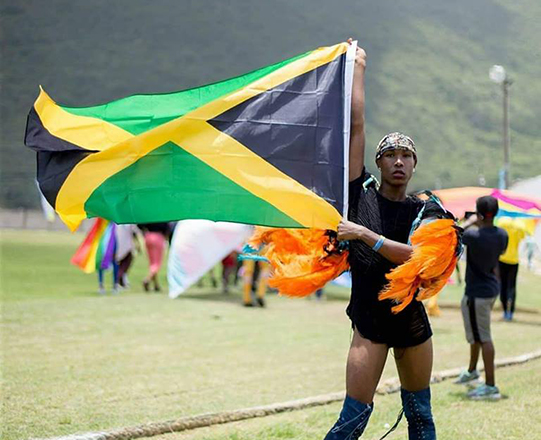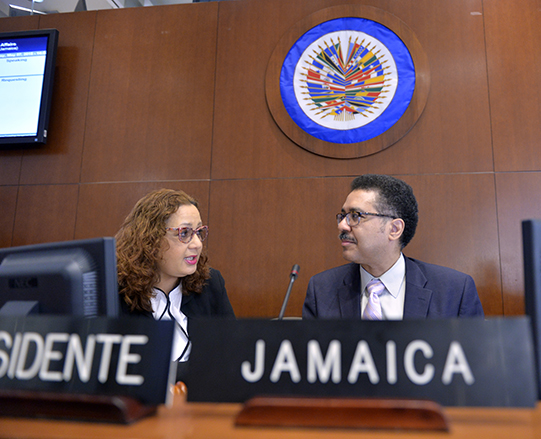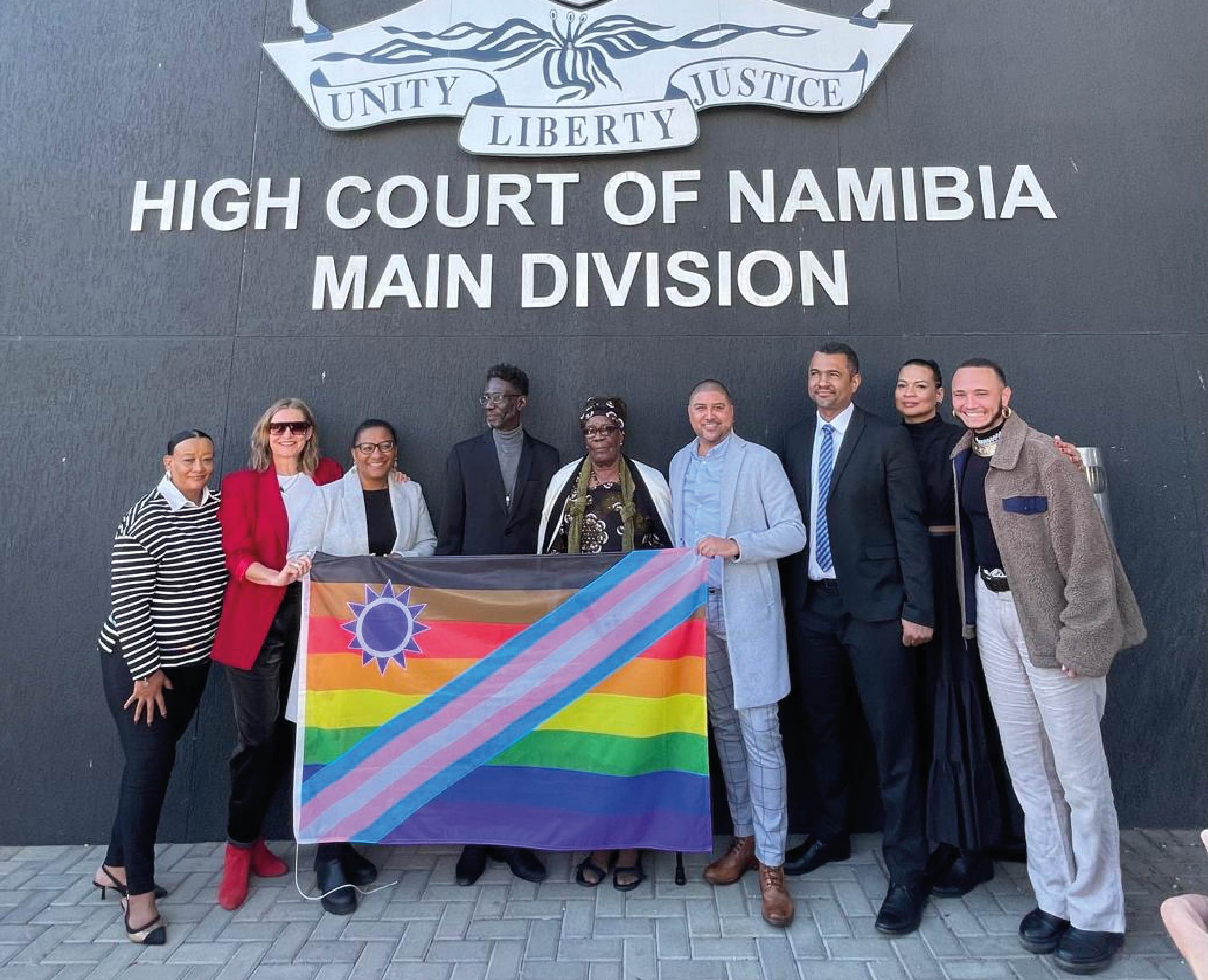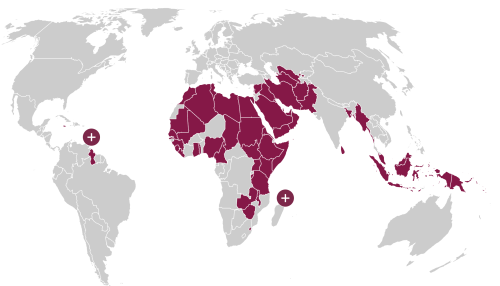A top human rights tribunal in the Americas has found the Jamaican government responsible for violating multiple rights of a gay man and a lesbian and urges an immediate repeal of the country’s homophobic laws.
The decision was made by the Inter-American Commission on Human Rights on 28 September 2019 but remained strictly confidential under their orders until today. The Human Dignity Trust (HDT), which brought the case before the Commission almost a decade ago in 2011, says it is a crucial and precedent setting legal victory.
As the first-ever decision of the Commission to find that laws criminalising lesbian, gay, bisexual and transgender (LGBT) people violate international law, this is now the landmark LGBT human rights case for the entire Caribbean region.
The Jamaican claimants in the case, Gareth Henry, a gay man living as a refugee in Canada, and Simone Edwards, a lesbian who was also forced to flee the country, had argued that sections of the 1864 Offences Against the Person Act – a British colonial-era law that outlaws the ‘abominable crime of buggery’ and acts of ‘gross indecency’ with punishments of up to ten years in prison with hard labour – violate their rights and legitimise violence towards the entire LGBT community in Jamaica.
HDT and its legal team, led by Caribbean lawyer Douglas Mendes SC, represented the two Jamaicans, working closely with leading LGBT organisation the Jamaican Forum for Lesbians, All-Sexuals and Gays (J-FLAG).
In its decision, the Commission said that Jamaica is responsible for the violation of multiple rights of the claimants enshrined in the American Convention on Human Rights, including the rights to humane treatment, equal protection before the law, privacy and freedom of movement and residence.
Téa Braun, Director of HDT, said, ‘This is a major legal victory for Gareth, Simone and the entire LGBT community in Jamaica and the wider Caribbean, where nine countries continue to criminalise consensual same-sex intimacy. It is a highly significant step forward that must now accelerate the repeal of these stigmatising and discriminatory laws.’
Mr Henry, who sought asylum in Canada in 2008 after enduring police brutality and repeated attacks by homophobic gangs, said, ‘All my life people have told me that who I am and who I love is wrong. Now, for the first time ever, I finally feel I am right. I take heart from the Commission’s bold and principled decision, and sincerely hope that it signals the beginning of meaningful change for our country.’
Ms Edwards was shot multiple times outside her home in 2008 by two men belonging to a homophobic gang, who tried to kill her and two brothers, one of whom is also gay. Following a series of police failures to protect her and her family, she was granted asylum in Europe. She said, ‘It’s a real boost to see that the Commission is taking our complaint seriously. It gives me hope that one day these outdated laws will be done away with, and I’ll be able to return to my homeland without fear of attack.’
Most significantly, the Commission urges the government to repeal the sections of the Offences Against the Persons Act that criminalise consensual sexual conduct between men, and to ensure measures are in place to prevent, investigate and punish incidences of violence against all LGBT people.
In a progressive move, the Commission also recommended the government enact anti-discrimination laws to protect LGBT people, and provide training for the police and security forces, who have long been complicit in or perpetrators of violence and harassment against LGBT Jamaicans.
All my life people have told me that who I am and who I love is wrong. Now, for the first time ever, I finally feel I am right. I take heart from the Commission’s bold and principled decision, and sincerely hope that it signals the beginning of meaningful change for our country
The case is set against a long-standing backdrop of persecution in the nation of three million people. According to J-FLAG, although they have recorded around 400 violations of Jamaican LGBT peoples’ human rights since 2011, the vast majority suffer homophobia and transphobia in silence, reluctant to go to the police because of fear of discrimination, retaliation or inaction. Incidents were commonly perpetrated by family members, friends, church members, police officers, employers, landlords, security guards and mobs on the street.
There are, however, small signs of change. In a 2019 survey on attitudes related to LGBT people in Jamaica a 5% increase in tolerant and positive attitudes was recorded in comparison to 2015 levels. Tolerance is notably higher among politicians in contrast to the general public.
A second decision in a similar petition against Jamaica, which reiterates the findings in the Henry and Edwards decision, was delivered by the Commission on 5 December 2019.
Notes to editors
- Read the full decision from the Inter-American Commission’s final report on 31 December 2020. Visit our interactive map to see which countries across the world still criminalise LGBT people and find out more on our Jamaica country profile.
- Read our case digest of the decision.
- The Inter-American Commission on Human Rights is a body of the Organization of American States (OAS) whose mission is to promote and protect human rights in the American hemisphere. It is composed of seven independent Commissioners who serve in a personal, expert capacity. Created by the OAS in 1959, the Commission has its headquarters in Washington, D.C.
- The Human Dignity Trust works with LGBT activists around the world to defend human rights in countries where private, consensual, same-sex sexual activity is criminalised. We provide free legal advice to local organisations that are challenging laws that persecute people on the basis of their sexual orientation and/or gender identity.
- J-FLAG is a human rights and social justice organisation that advocates for the rights, livelihood and well-being of lesbian, gay, bisexual and transgender (LGBT) people in Jamaica.
- The pro bono legal team who worked on the case with HDT comprises international law firm Freshfields Bruckhaus Deringer and senior counsel Douglas Mendes SC and Edward Fitzgerald QC, with advisory input from Professor Clara Sandoval-Villalba and Monica Feria-Tinta.
For more information contact:
Emma Eastwood, Head of Strategic Communications, HDT
T: +44 (0)20 7419 3770 / E: [email protected] / Twitter: @HumanDignityT




